182 Search Results for rett
March 1, 2015
by Carole Zangari -
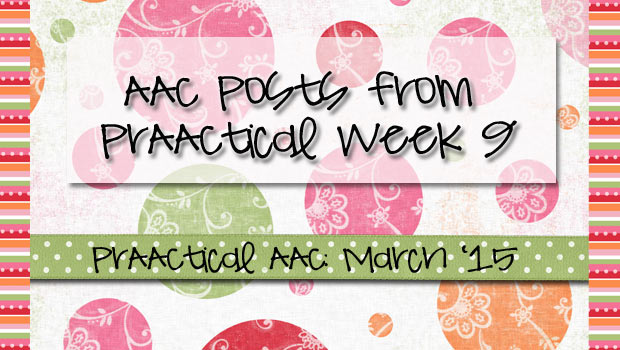
Was it a busy week where you live? Here are some AAC posts you may have missed. Monday: Magic Moments with Word Clouds Tuesday: Teach Me Tuesday: TalkRocket Go by My Voice Wednesday: Video of the Week – Communication Supports for People with Rett Syndrome Thursday: Strengthening the Core: Getting Ready for March Core Vocabulary
November 20, 2014
by Carole Zangari -
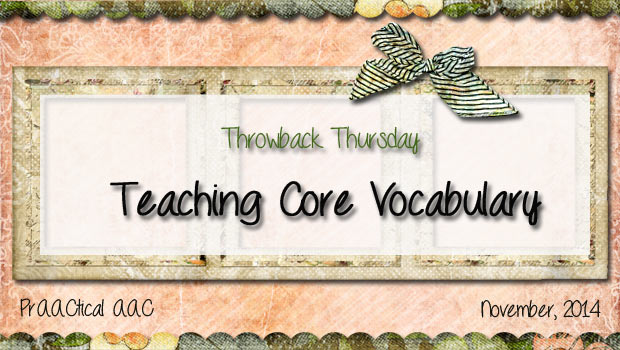
While I’m soaking up AAC knowledge at the ASHA Convention, here’s a post from the past. :::::::::::::::::::::::::::::::::::::::::::::::::::::::: Among the many changes that the AAC field has experienced in the last decade is the notion that core vocabulary is (or should be) an integral part of any AAC system. We grew to understand the limitations of AAC supports that consist primarily of nouns and descriptors, realizing that those kinds of communication displays restricted our clients to requesting and labeling. Our field realized the inadequacy of providing only prestored messages (e.g., limited the client’s ability to communicate anything novel, not flexible enough to meet most communication needs, etc.). In essence, we realized that without core vocabulary, we were imposing a ceiling on language development. We’re thrilled to see so many communication boards, books, SGDs, and AAC apps reflect this knowledge. Having tools with the appropriate vocabulary is a big step in the... [Read More...]
October 23, 2014
by Carole Zangari -
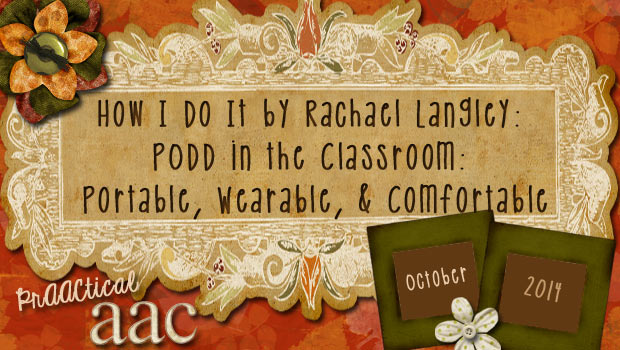
We return to Michigan today to hear more from school-based SLP, Rachael Langley. In this post, Rachael shares some prAACtical thoughts on making PODD books always available for communication. ::::::::::::::::::::::::::::::::::::::::::::::::::::::::::::::::::::::::: The PODD system offers a complete language approach through carefully organized symbol sets. Because the PODD system promotes a language immersion model, there is no pressure on our language-learners reproducing specific words or patterns at a specific rate. The primary requirement is that adults are modeling PODD for our language-learners. In order to be sure that the PODD books were being used throughout the day, the books had to be PORTABLE, WEARABLE, and COMFORTABLE. Forget any of these three features and PODD books are at a high risk of being stuck on a shelf. My new hobby has become collecting other people’s ideas for how to make PODD books comfortable to carry around. I’ll spare you the pictures of my... [Read More...]
October 1, 2014
by Carole Zangari -
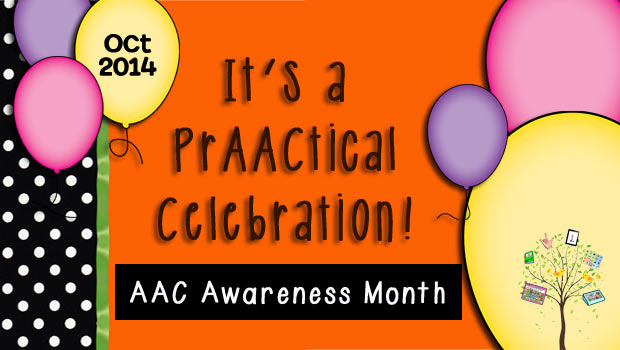
Could it really be October already?! Let’s start off AAC Awareness Month with a giveaway. We are so grateful to the following organizations for donating raffle prizes for this drawing. Please take a moment to thank them. Aacorn Ablenet Alexicom Appy Therapy Choice Works/Bee Visual Hump Software Lesson Pix News 2 You Safe N Sound Mobile Saltillo Smarty Ears Speak For Yourself Speak MODalities SpeechPathology.com Speech Tree Apps TapSpeak Therapy Box Tobii-Dynavox How Does It Work? We use Rafflecopter to administer the giveaways. All entries made through there will be counted toward our drawings. Once we’ve drawn our winners, we’ll send an email to each one. You’ll need to be a good sport to play along because we’re not going to get into requests for specific prizes or substitutions. (As I learned from wise-beyond-her-years Pauleen, “You get what you get, and you don’t get upset.” Love that!) The winners will... [Read More...]
September 18, 2014
by Carole Zangari -
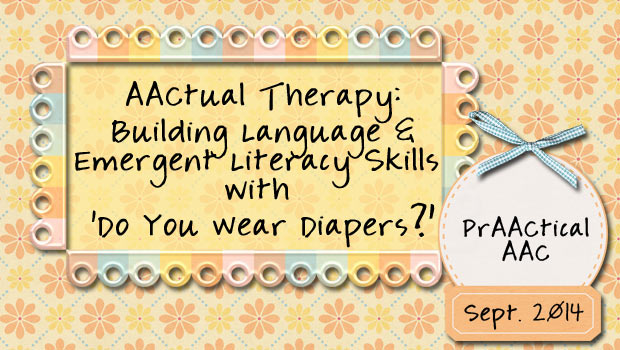
What’s more fun than using story books to teaching language to young children with AAC needs? Today, we hear from Kimberly Scanlon, an SLP practicing in New Jersey. Kimberley is is a devoted mom, wife and dog lover and blogs at Scanlon Speech and My Toddler Talks. She is the author of My Toddler Talks: Strategies and Activities to Promote Your Child’s Language Development and is finishing a unique picture and activity workbook, Learning to Read is a Ball. ::::::::::::::::::::::::::::::::::::::::::::::::::::::::::: Hold on to your undies, today we’re going to talk about poop, diapers, and the location of where various animals go potty. Sounds like a good time, right? Kidding aside, in this post I’m going to show you how to use this adorable picture book, Do You Wear Diapers? by Tanya Roitman to facilitate language and emergent literacy development in toddlers and preschoolers. What’s this book about? It’s a potty book! This adorable board book... [Read More...]
June 23, 2014
by Robin Parker -
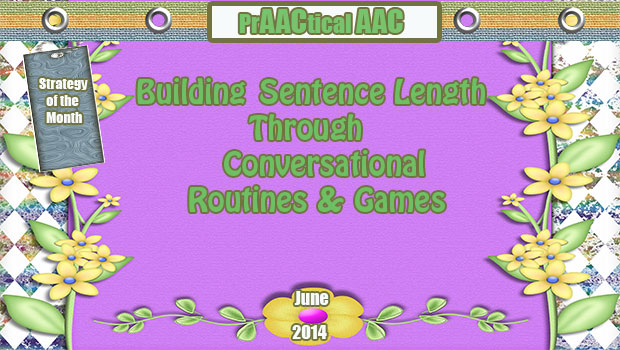
Building sentence length beyond the simple sentence level can be a lot of fun for those of us who love language. Additionally, and even more important, expanded sentences can provide communication impact and power to the communicator. Expanded sentences usually means moving from the simple to complex sentence. As Carole mentioned last week, we often begin with conjunctions like ‘because’, ‘but’, ‘so’, ‘if’, before’, after’. Here are some ideas for conversational routines and games that allow for frequent repetition with variety as well as strong communication power that will help with making it worthwhile to use longer sentences. “Pretty Please” Routine- This routine involves using ‘because’ to negotiate with longer sentences. This routine is reserved for requests that are possible but not always honored. In the case of teaching, we start with requests that can be honored if “pretty please because I worked hard or some other reasonable reason is... [Read More...]
May 21, 2014
by Carole Zangari -
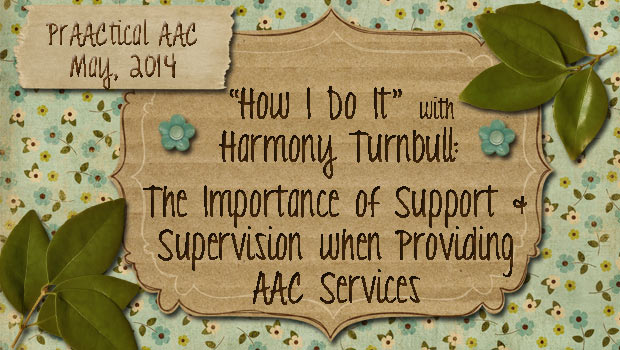
We are so thrilled to have a guest post today, from Australian SLP Harmony Turnbull. Harmony is a Consultant Speech Pathologist for Ageing, Disability and Home Care in NSW, Australia. In her role, she provides support and supervision to senior speech pathologists, carries a small caseload of people with complex needs and provides expert consultancy for management. She has specialised in supporting people with disabilities including complex communication needs for 11 years and is addicted to networking. She can often be found sharing her knowledge and asking many questions on Facebook and Twitter (@SP_Harmony). Harmony is passionate about the work speech/language pathologists can do to improve the quality of life for people with disabilities. The Importance of Support and Supervision when Providing AAC Services Scenario – Jane Jane is an SLP who has been working with people with disabilities for over 5 years, including people with complex communication needs. Her caseload... [Read More...]
May 5, 2014
by Carole Zangari -
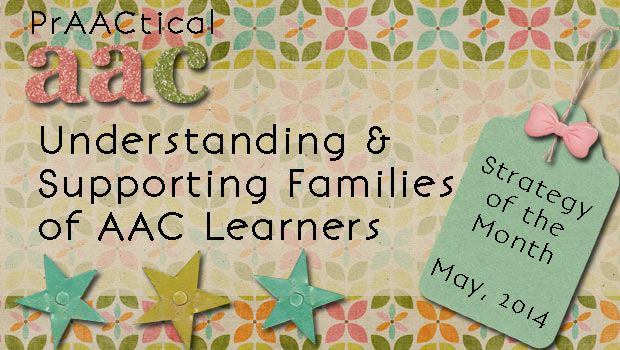
Let’s start with a basic premise: We can’t maximize AAC learning outcomes unless we’re working well with families. This is easier said than done, especially in some settings. As a clinician in a university clinic, for example, seeing families is the norm. We get to interact with them before and after the therapy. They get to observe or participate in the session. We can show them the data, observe how they interact with the AAC user in their family, and answer questions as they arise. And even with all of that, supporting them is challenging in that it takes time, skill, and planning. Although it is one of our favorite things to do, it’s not always easy to align our actions with our (stellar, ambitious) intentions. Multiply that by a factor of a zillion for our colleagues in schools and other settings where frequent, casual interactions are difficult to come... [Read More...]
March 7, 2014
by Carole Zangari -
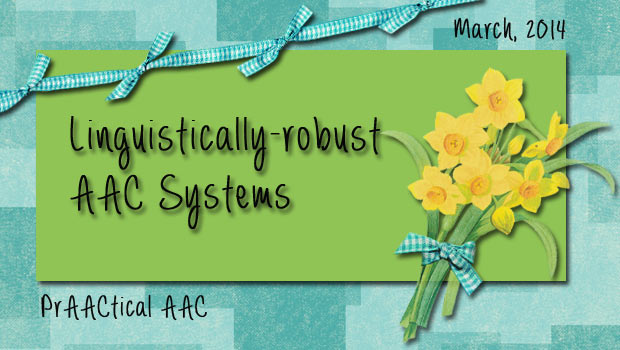
At the NCACA conference last month, a few of us were talking about what it means to have an AAC device or app with a strong language system, something Gail Van Tatenhove and I wrote about a few years ago in this book. Linguistically-robust language systems are those that will allow someone to construct grammatically correct utterances. Think of the different SGDs or AAC apps that you worked with this week. If you could use them to recreate the last 30 minutes of ‘talk time’ that you had without spelling out too many of the words, chances are pretty good that it is a linguistically-robust system. That led to us asking ourselves and others a question. “What do you look for in terms of a language system when you’re considering SGDs or AAC apps for a learner who has the potential to (eventually) construct grammatically correct utterances?” Keep in mind... [Read More...]
March 5, 2014
by Carole Zangari -
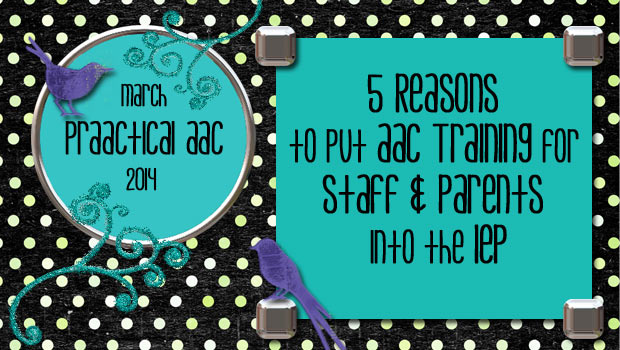
SLPs tend to love (good, relevant) professional development. We flock to conferences (15,000+ ASHA attendees this past November), sign up for workshops, and attend webinars. But for some reason, we are reluctant to request training as part of the IEP process, even when we’re not very confident in our work with the student. Maybe we don’t want to acknowledge our need for it, or admit that there is something we don’t know (gasp!). Perhaps we’d just rather not make waves. We may ask for training informally, but it doesn’t always get tied to specific students’ IEPs, and that may mean that our requests get overlooked. Here are a few reasons why you may want to put staff training into IEPs when needed. We need it. The complexity of the AAC field, diversity of this clinical population, and the rapid pace of change in technology make it very unlikely that any... [Read More...]









